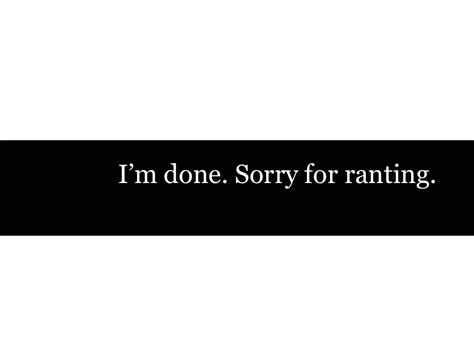You’ve been through a lot lately. You’ve had a lot of stress and things haven’t been going your way. You’ve felt like you’re holding everything in, and you’ve just needed to let it all out.

I know that ranting can be a helpful way to release steam and let go of some of the pent-up frustration and anger that you’re feeling. But I also know that it can be off-putting to others.
People may not understand why you’re so angry, or they may not agree with the things that you’re saying. They may even get angry with you for ranting.
I’ve been there, and I know how it feels. I’ve been through a lot of stressful things in my life, and I’ve often felt like I needed to rant to someone. But I’ve also learned that it’s important to be mindful of the people around me, and to make sure that I’m not hurting their feelings.
So, if you’re feeling like you need to rant, please do it in a way that won’t hurt others. Talk to a friend or family member who you trust. Or, write in a journal.
And if you’re worried about what others will think of you, remember that it’s okay to be angry. It’s okay to let your emotions out. Just try to do it in a way that won’t hurt others.
Here are some tips for ranting in a healthy way:
- Talk to a trusted friend or family member. This is the best way to get your feelings out without hurting others.
- Write in a journal. This is a great way to get your thoughts and feelings down on paper, without having to worry about what others will think.
- Be mindful of your words. Try to avoid using hurtful or offensive language.
- Don’t rant for too long. A good rule of thumb is to limit your rant to five minutes or less.
- Take breaks. If you find yourself getting too worked up, take a break and come back to your rant later.
- Don’t apologize for ranting. It’s okay to be angry. It’s okay to let your emotions out. Just try to do it in a way that won’t hurt others.
Ranting can be a helpful way to release steam and let go of some of the pent-up frustration and anger that you’re feeling. It can also help you to:
- Process your emotions. Ranting can help you to make sense of your feelings and to understand why you’re so angry.
- Relieve stress. Ranting can help to relieve stress and tension.
- Connect with others. Ranting can help you to connect with others who have experienced similar things.
Ranting can be helpful, but it’s important to be mindful of the people around you. Ranting can be off-putting to others, and it can even hurt their feelings.
Here are some signs that your ranting is not helpful:
- You’re hurting others. If you’re ranting in a way that is hurtful to others, please stop. It’s not okay to hurt others, even if you’re feeling angry.
- You’re not getting anything out of it. If you’re ranting but you’re not getting anything out of it, then it’s probably not worth your time.
- You’re ranting too often. If you’re ranting all the time, it may be a sign that you’re not dealing with your emotions in a healthy way.
If you’re finding that your ranting is not helpful, there are some things you can do to stop.
- Identify your triggers. What are the things that make you want to rant? Once you know what your triggers are, you can start to avoid them.
- Find healthier ways to cope with stress. There are many healthy ways to cope with stress, such as exercise, yoga, or meditation.
- Talk to a therapist. A therapist can help you to understand why you’re ranting and to develop healthier coping mechanisms.
Ranting can be a helpful way to release steam and let go of some of the pent-up frustration and anger that you’re feeling. However, it’s important to be mindful of the people around you and to make sure that you’re not hurting their feelings. If you’re finding that your ranting is not helpful, there are some things you can do to stop.
